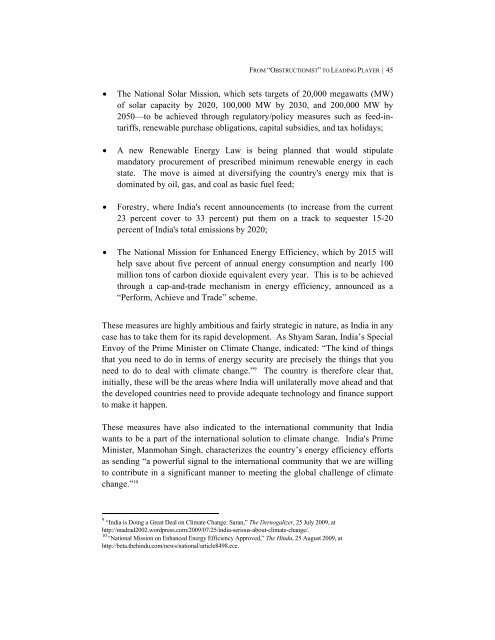Indian Climate Policy - Global Commons Institute
Indian Climate Policy - Global Commons Institute
Indian Climate Policy - Global Commons Institute
You also want an ePaper? Increase the reach of your titles
YUMPU automatically turns print PDFs into web optimized ePapers that Google loves.
FROM “OBSTRUCTIONIST” TO LEADING PLAYER | 45<br />
<br />
<br />
<br />
<br />
The National Solar Mission, which sets targets of 20,000 megawatts (MW)<br />
of solar capacity by 2020, 100,000 MW by 2030, and 200,000 MW by<br />
2050—to be achieved through regulatory/policy measures such as feed-intariffs,<br />
renewable purchase obligations, capital subsidies, and tax holidays;<br />
A new Renewable Energy Law is being planned that would stipulate<br />
mandatory procurement of prescribed minimum renewable energy in each<br />
state. The move is aimed at diversifying the country's energy mix that is<br />
dominated by oil, gas, and coal as basic fuel feed;<br />
Forestry, where India's recent announcements (to increase from the current<br />
23 percent cover to 33 percent) put them on a track to sequester 15-20<br />
percent of India's total emissions by 2020;<br />
The National Mission for Enhanced Energy Efficiency, which by 2015 will<br />
help save about five percent of annual energy consumption and nearly 100<br />
million tons of carbon dioxide equivalent every year. This is to be achieved<br />
through a cap-and-trade mechanism in energy efficiency, announced as a<br />
“Perform, Achieve and Trade” scheme.<br />
These measures are highly ambitious and fairly strategic in nature, as India in any<br />
case has to take them for its rapid development. As Shyam Saran, India’s Special<br />
Envoy of the Prime Minister on <strong>Climate</strong> Change, indicated: “The kind of things<br />
that you need to do in terms of energy security are precisely the things that you<br />
need to do to deal with climate change.” 9 The country is therefore clear that,<br />
initially, these will be the areas where India will unilaterally move ahead and that<br />
the developed countries need to provide adequate technology and finance support<br />
to make it happen.<br />
These measures have also indicated to the international community that India<br />
wants to be a part of the international solution to climate change. India's Prime<br />
Minister, Manmohan Singh, characterizes the country’s energy efficiency efforts<br />
as sending “a powerful signal to the international community that we are willing<br />
to contribute in a significant manner to meeting the global challenge of climate<br />
change.” 10<br />
9 “India is Doing a Great Deal on <strong>Climate</strong> Change: Saran,” The Dernogalizer, 25 July 2009, at<br />
http://madrad2002.wordpress.com/2009/07/25/india-serious-about-climate-change/.<br />
10<br />
“National Mission on Enhanced Energy Efficiency Approved,” The Hindu, 25 August 2009, at<br />
http://beta.thehindu.com/news/national/article8498.ece.
















